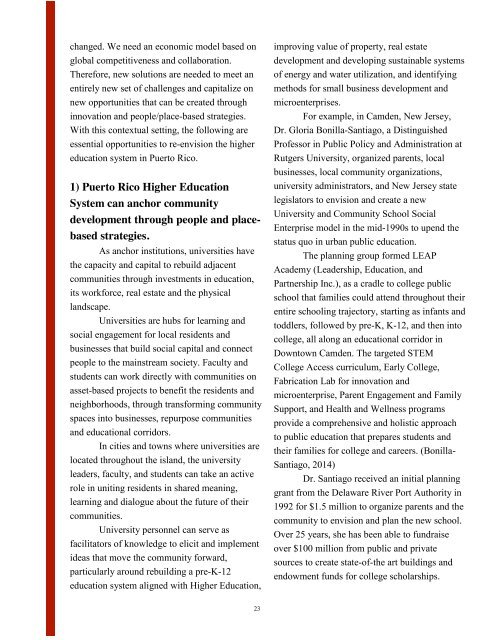CLC-Conference-Proceeding-2018
You also want an ePaper? Increase the reach of your titles
YUMPU automatically turns print PDFs into web optimized ePapers that Google loves.
changed. We need an economic model based on<br />
global competitiveness and collaboration.<br />
Therefore, new solutions are needed to meet an<br />
entirely new set of challenges and capitalize on<br />
new opportunities that can be created through<br />
innovation and people/place-based strategies.<br />
With this contextual setting, the following are<br />
essential opportunities to re-envision the higher<br />
education system in Puerto Rico.<br />
1) Puerto Rico Higher Education<br />
System can anchor community<br />
development through people and placebased<br />
strategies.<br />
As anchor institutions, universities have<br />
the capacity and capital to rebuild adjacent<br />
communities through investments in education,<br />
its workforce, real estate and the physical<br />
landscape.<br />
Universities are hubs for learning and<br />
social engagement for local residents and<br />
businesses that build social capital and connect<br />
people to the mainstream society. Faculty and<br />
students can work directly with communities on<br />
asset-based projects to benefit the residents and<br />
neighborhoods, through transforming community<br />
spaces into businesses, repurpose communities<br />
and educational corridors.<br />
In cities and towns where universities are<br />
located throughout the island, the university<br />
leaders, faculty, and students can take an active<br />
role in uniting residents in shared meaning,<br />
learning and dialogue about the future of their<br />
communities.<br />
University personnel can serve as<br />
facilitators of knowledge to elicit and implement<br />
ideas that move the community forward,<br />
particularly around rebuilding a pre-K-12<br />
education system aligned with Higher Education,<br />
improving value of property, real estate<br />
development and developing sustainable systems<br />
of energy and water utilization, and identifying<br />
methods for small business development and<br />
microenterprises.<br />
For example, in Camden, New Jersey,<br />
Dr. Gloria Bonilla-Santiago, a Distinguished<br />
Professor in Public Policy and Administration at<br />
Rutgers University, organized parents, local<br />
businesses, local community organizations,<br />
university administrators, and New Jersey state<br />
legislators to envision and create a new<br />
University and Community School Social<br />
Enterprise model in the mid-1990s to upend the<br />
status quo in urban public education.<br />
The planning group formed LEAP<br />
Academy (Leadership, Education, and<br />
Partnership Inc.), as a cradle to college public<br />
school that families could attend throughout their<br />
entire schooling trajectory, starting as infants and<br />
toddlers, followed by pre-K, K-12, and then into<br />
college, all along an educational corridor in<br />
Downtown Camden. The targeted STEM<br />
College Access curriculum, Early College,<br />
Fabrication Lab for innovation and<br />
microenterprise, Parent Engagement and Family<br />
Support, and Health and Wellness programs<br />
provide a comprehensive and holistic approach<br />
to public education that prepares students and<br />
their families for college and careers. (Bonilla-<br />
Santiago, 2014)<br />
Dr. Santiago received an initial planning<br />
grant from the Delaware River Port Authority in<br />
1992 for $1.5 million to organize parents and the<br />
community to envision and plan the new school.<br />
Over 25 years, she has been able to fundraise<br />
over $100 million from public and private<br />
sources to create state-of-the art buildings and<br />
endowment funds for college scholarships.



